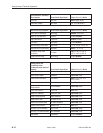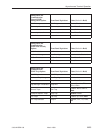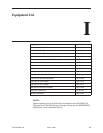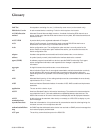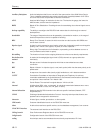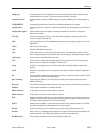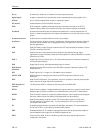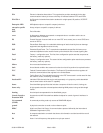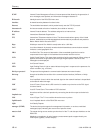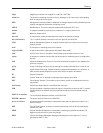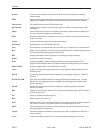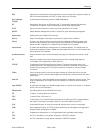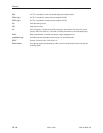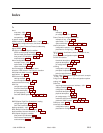
Glossary
GL-4
3160-A2-GB21-80
March 1999
A mechanical, electrical, or electronic unit with a special purpose.
A signal composed of only two discrete values, representing the binary digits 0 and 1.
A thin, flexible magnetic disk enclose in a protective jacket.
Download branch of the DSU/CSU menu tree.
DTE Loopback. Loopback mode that loops the information received on the DTE T1
network interface back to the network as close to the network interface as possible.
A process that transfers device firmware and software from a locally-attached PC to a
device, or allows the duplication of firmware and software from a local device to a remote
device.
A device that is connected farther from the host computer.
An interconnection point for terminals, multiplexers, and transmission facilities. Individual
channels may be inserted into the aggregate stream or dropped out to accommodate
specific applications.
Data Set Ready. A signal from the modem to the DTE that indicates the modem is turned
ON and connected to the DTE.
Data Service Unit. Data communications equipment that provides timing, signal
regeneration, and an interface to data terminal equipment. A subrate DSU/CSU is normally
referred to as a DSU.
Digital Signal Cross Connect level 1. An interconnection point for terminals, multiplexers
and transmission facilities.
Digital Signal Level 0. A 64 kbps standard signal or channel.
Assigning specific DS0 channels in the DSU/CSU to specific interfaces (network, DTE
Drop/Insert, etc.).
Digital Signal level 1. A signal of 1.544 Mbps in North America.
Defines objects for managing the network and DTE Drop/Insert interfaces on the
DSU/CSU.
Data Terminal Equipment. The equipment, such as a computer or terminal, that provides
data in the form of digital signals for transmission.
The Drop/Insert (DSX-1) interface on the rear panel of the DSU/CSU.
Data Terminal Loopback. Loopback mode that loops the data for a particular synchronous
data port back to the port just before it is combined with the rest of the T1 data stream.
Dual-Tone Multi-Frequency. A signaling method using two voice frequencies to designate
the tones used for touch-tone dialing, as distinguished from pulse dialing.
Data Terminal Ready. A signal from the DTE to the modem, sent via Pin 20 of the
EIA-232 interface (V.24 circuit 108/1, /2), that indicates the DTE is turned ON and
connected to the modem.
A wideband digital interface operating at 2.048 Mbps, defined by ITU recommendations
G.703 and G.704. It is used primarily outside North America.
Embedded Data Link. The 8 kbps in-band performance channel that provides 4 kbps of
user bandwidth for the support of an SNMP management link.
Excessive Error Rate. An error rate that is greater than the threshold that has been
configured in the device.
device
digital signal
diskette
DL branch
DLB
download
downstream device
drop/insert
DSR
DSU
DSX-1
DS0
DS0 channel
allocation
DS1
DS1/E1 MIB
DTE
DTE Drop/Insert
interface
DTLB
DTMF
DTR
E1
EDL
EER



